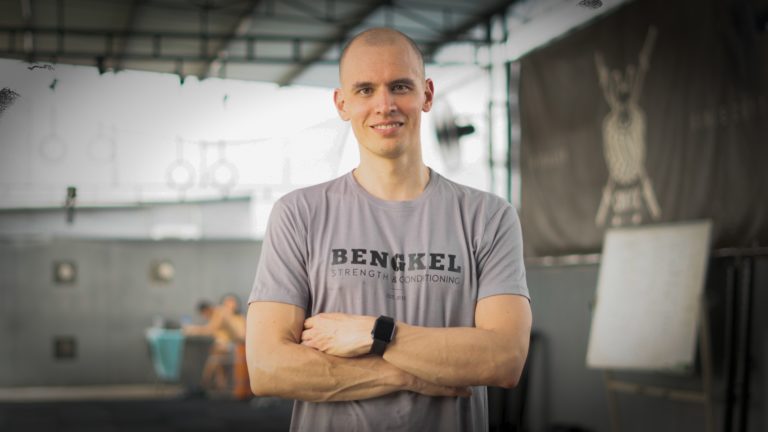4 Guiding Questions for Making Your Exercise Habits Last

People often think lack of exercise is a problem of time, skill, or motivation. Have you ever considered it might be about identity?
‘I don’t work out because in my mind I’m still a star athlete’. This sounds counter intuitive, but it was the conclusion one of our clients arrived at. In his youth he had been a world-class skier. Today at 60, he barely exercised. Why? Because he maintained the idea of himself as the star athlete, so hitting the slopes and finding he wasn’t as fast, nimble, or strong as at 30 was too painful. So rather than being confronted with reality, he avoided exercise and maintained his identity.
Another client experienced the reverse: ‘I’ve stopped going to the gym, so I must be terribly unfit and unhealthy’. Daily activity data proved this wrong: her 12,000 daily average steps more than made up for her non-existent gym routine. What was more detrimental was the identity of seeing herself as ‘unfit and unhealthy’.
Everyone has a different relationship with exercise. For some people, it’s the foundation of their lifestyle, whilst for others it doesn’t even factor into their routine. Your relationship with physical activity is your ‘exercise identity’. The stronger and more positive your association to exercise, the more likely you are to prioritise it against other demands on your time. Conversely, the opposite is true.
So how can you craft a positive exercise identity? Working through these 4 questions will unpack your beliefs and attitudes towards exercise. Shaping these attitudes can help shape your exercise behaviours and strengthen your resolve to create healthy exercise habits.
Question 1: What do I want from physical activity?
This question reaches deep within to unlock your personal motivation and drive towards physical activity. The range of responses it elicits from clients offers an insight into their deeper hopes, dreams, and fears:
‘I want to be part of a team and compete together’,
– Andrew, Partner
‘I want to be able to keep up with my grandchildren in the future’,
– Suen, Multinational Market Practice Leader
‘I want to fit into my pre-pregnancy wardrobe again’,
– Charmaine, Senior VP
‘I’d love to cross the finish line of an Ironman triathlon’ ,
– Stephanie, Finance Director
‘I want to have fun’,
– Simon, Consultant
You might uncover multiple aspirations related to exercise. Each presents an important driver and incentive to dedicate time to physical activity. Consider what you get today and what you get 20 years from now, think about the physical benefits but also the boost in mood, and imagine what an active life and an inactive life looks like for you personally and for those around you.
Question 2: What type of activity do I enjoy?
Cycling, climbing, hockey, swimming, running, football, yoga, jiu jitsu… Your choice might come automatically though it’s worth exploring beyond the usual activities. Think back to your childhood and remember which sports you enjoyed then.
Renata, Senior Executive recalls: ‘I hated everything sports related after being traumatised by PT at school, though a friend introduced me to roller skating and I love it. It’s not something I’d have even thought about or dared to go along on my own’.
Matt reminisces: ‘I used to spend hours kicking a ball about with my friends. It’s something I’d forgotten about after university and work took over my life. I recently joined a local team where we meet up in the evening and I really enjoy catching up with my team mates once a week’.
Do you get joy out of the exercise you do today? Reflect on the opportunity to re-connect with a favourite physical pastime or perhaps learn a new skill.
Question 3: What challenges do I face being physically active?
Lack of time, a heavy workload, family and life responsibilities – these are the most referenced challenges our coaching clients cite.
‘My day consists of sitting in front of a screen for 14hrs and 5hrs sleeping. Any time in-between is spent with my family. Spare time simply doesn’t exist’, Sonia, VP at a FTSE 100 tech company describes. ‘However, if 7 minutes of exercise boosts my mood for up to twenty-four hours; I’ll take advantage of that!’
Other reasons could be a long daily commute, weekly travel, lack of access to a gym or training facility, or lack of knowledge or skills around physical fitness.
Jamie, Director at a global technology company, faced a different challenge: limiting beliefs formed during childhood. ‘My brother was an excellent sportsman who excelled at every sport possible and played county-level rugby and cricket. I was really bad at sports and sought refuge in music. Even thinking about it now puts me off taking part in physical activity’.
Past experiences can linger on and shape our lives; whether it’s sibling rivalry, pushy parents, or peer pressure. It’s important to realise you’re more than your past and a different future can be created.
This question dives into every possible barrier (or excuse!) behind the challenges you face. Think about what is within or beyond your control. Be honest with yourself and make a list. Identifying the issues is the first step to a solution.
Question 4: What can I commit to?
‘Nothing! I want to commit to at least something…but it’s impossible’, Naomi, a Global Strategic Sales Leader with two young children stated before describing how every minute of her day was allocated to work or family.
Our work together sought to blend activities; walking meetings with colleagues and clients, using her standing desk 3 hours a day (which repeated 5 days a week for one year is the energy equivalent of 10 marathons!), integrating mobility exercises to one daily meeting; and running alongside her kids’ scooters or bikes on family weekend walks. Two months later, Naomi describes how she has more energy, feels more positive, and enjoys family exercise time.
Be realistic. Don’t over-commit. What’s possible alongside your working week? When you’re pressed for time the prospect of squeezing in a hour-long gym sessions is unlikely. Instead, think about ‘movement snacks’ that can be integrated into each day.
To create a habit around exercise can take something like 66-days. So ask yourself: what do you want your life to look like two months from now, and what could you both enjoy and commit to doing starting today? Then keep that goal in mind, and think: is there something I could do right now?



